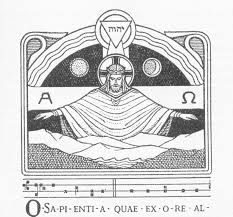 I try, in some small way, and not, I must admit, very well, to resist the celebration of Christmas before Christmas. I know this is a weathered lament, but one that merits restating: We prepare for Christ in the season of Advent, and we celebrate his arrival with Christmas. The zeitgeist of the age, outside and, to some extent, even within, the Church, is difficult to resist, with everything from social events to advertisements in shops to songs, but resist to some extent we must. Some application to bodily and spiritual preparation is requisite so that Christmas remains Christmas, and that the celebration does not end the day after Christmas, just when it is supposed to begin. (Which day, incidentally, is not Boxing Day, but the feast of (Saint) Stephen, the first martyr, as the opening lines of the traditional hymn on Good King Wencelsaus makes clear).
I try, in some small way, and not, I must admit, very well, to resist the celebration of Christmas before Christmas. I know this is a weathered lament, but one that merits restating: We prepare for Christ in the season of Advent, and we celebrate his arrival with Christmas. The zeitgeist of the age, outside and, to some extent, even within, the Church, is difficult to resist, with everything from social events to advertisements in shops to songs, but resist to some extent we must. Some application to bodily and spiritual preparation is requisite so that Christmas remains Christmas, and that the celebration does not end the day after Christmas, just when it is supposed to begin. (Which day, incidentally, is not Boxing Day, but the feast of (Saint) Stephen, the first martyr, as the opening lines of the traditional hymn on Good King Wencelsaus makes clear).
In the Western tradition of the Catholic Church, one of the liturgical preparations for Christmas are the ‘O Antiphons’, seven titles from the Old Testament pointing to the coming Messiah. The origin of their compilation goes back to the dawn of the Middle Ages, with reference to them in the writings of Boethius (480-524 a.d.). The seven antiphons, which begin on December 17th, and end today, on December 23rd, are as follows, in their Latin original: O Sapientia, O Adonai, O Radix Iesse, O Clavis David, O Oriens, O Rex Gentium, and O Emmanuel.
They are, in their somewhat variable English translations, O Wisdom, O Lord God, O Root (or Rod) of Jesse, O Key of David, O Rising Sun (or Morning Star), O King of the Nations (or Gentiles) and O Emmanuel.
Each day, these antiphons comprise the basis for the antiphons at Vespers, the universal Evening Prayer of the Church. Readings also go along with each antiphon, taken from the Old Testament , and making clear how each of these titles allegorically referred to the coming Messiah.
It is a curious phenomenon, and unclear whether intentional, that the first letter in the antiphons, when spelled backwards, makes ero cras, which is Latin for “I will be (there?) tomorrow”. This could be coincidence, but the mediaeval theologians loved puns and plays upon words, so we may surmise the antiphons were deliberately framed this way, to help us even further in our ‘waiting upon’ the Christ, who would free His people from their sins, and offer the world redemption.
So a merry and blessed Christmas to one and all…
